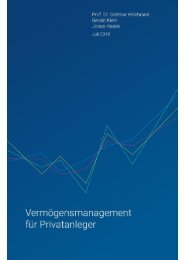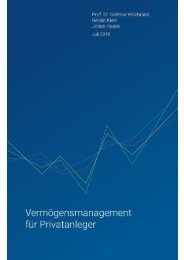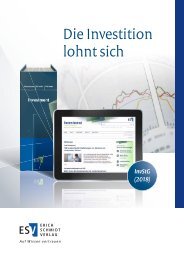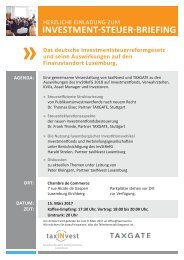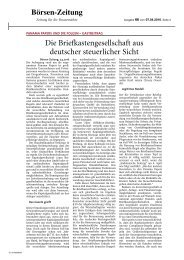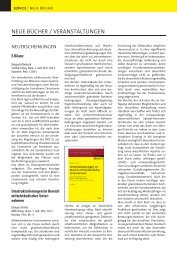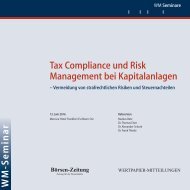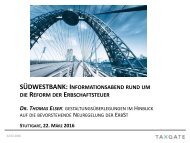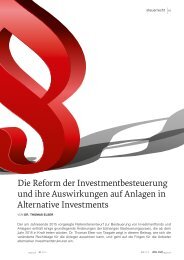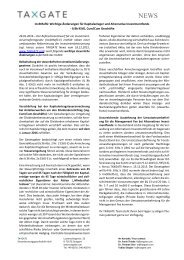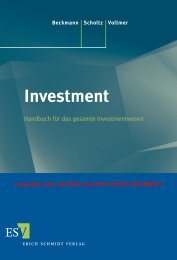Create successful ePaper yourself
Turn your PDF publications into a flip-book with our unique Google optimized e-Paper software.
THOUGHT LEADERSHIP ASIA PACIFIC
H O N G K O N G S A R
next generation born in an internet age, they are digital natives comfortable
with the new economy, the technologies and opportunities
presented.
Where the next generation is involved in the business, this has
helped many family enterprises to adapt and digitally transform, especially
during the COVID-19 pandemic which hastened the digital
journey if the businesses are to survive in a post-COVID-19 world.
Handing over of the reins
In the past couple of years, we are seeing more next generation starting
to take a more active role in the family enterprise and investing
the family’s wealth often in a more institutionalised manner, probably
due to a convergence of factors:
• The patriarchs and matriarchs are advancing in age
• There is a return of the next generation to the family enterprises,
after working outside and having gained expertise and experiences
• The network that the next generation has built socially and professionally
is starting to take root.
• Emergence of the new economy, where the next generation often
relate better to and have an interest in.
We are also seeing the transition occur earlier. In the past, the
handing over the reins may take place upon certain events such as the
passing of the patriarch or matriarch. There is now an increasing
trend where the next generation is taking over while the patriarch or
matriarch is still capable and can tap on their deep experiences to provide
the guidance and stewardship as needed.
Well thought out wealth transition plan
With globalisation, families are increasingly holding investments and
assets outside their home jurisdiction. Coupled with increased mobility
of the business owners and their family members, complexities
such as inheritance tax issues can arise due to estate duty and inheritance
tax rules in different countries. These may apply on different
types of assets ranging from shares in companies to immovable property.
For example, estate duty may be imposed when an individual is
not resident in a particular jurisdiction but holds moveable property
such as shares, artwork or fine wine within that jurisdiction.
With broader experiences and networks, families are increasingly
more aware of the need for proper succession and estate planning to
facilitate a successful transfer of their wealth and business to the next
generation. These include:
• Putting in place a family governance framework, where there is a
family constitution for family members to abide by. This also
aligns with the family and family enterprise’s values and vision for
the future.
• Timely implementation of arrangements and structures to address
estate duty and inheritance tax implications from assets held domestically
and overseas by the family.
• Having a framework that nurture and reward next generation for
their entrepreneurial and innovative efforts in the face of globalisation
and disruption. This involves attracting, motivating and retaining
the next generation to be involved in the family enterprise.
Single family offices – a choice that is now feasible
Wealth transition and succession planning is a journey and require
different tools, such as trusts, family holding companies, family constitution,
etc.. The single family office is an additional tool that is used
for wealth transition, and often used in conjunction with trusts and
family holding vehicles. It provides more structure and rigour as
Asian families’ needs become more complex, more sophisticated solutions
are demanded.
With the development of single family offices, retaining ownership
of the family enterprise no longer necessarily means having the next
generation to run the family enterprises. For example, professional
management teams may be brought in to run the family enterprises
day- to-day operations, while the next generation can work in the
family office to manage the investment portfolio, as well as provide
strategic oversight on the family enterprises. This also allows for external
expertise to be brought in to run the family enterprise, while according
strategic oversight to the family to meet the long-term goals
of the family and the business.
Even with COVID-19 pandemic in 2020, we anticipate this trend
of single family offices to continue because: -
a) Families look towards seizing the window for investments during
this period, due to:
• Portfolio rebalancing
• Making opportunistic investments
The nimbleness of a single family office to switch between investment
focus and asset classes is a key advantage. This is due to the wide and
flexible mandate of a single family office, as well as the flatter organisation
that also means decisions can be made much quicker.
b) Single family offices manage “patient” capital and this meant that
they can afford to wait before deploying its assets under management
(AUM) to make investments. They can also have a much
longer investment horizon than many financial institutions and investment
funds. This allows family offices to take contrarian investment
positions and invest in times when others are exiting.
c) Many investment vehicles of family offices often enjoy tax exemption
on qualifying income. For example, as Singapore’s tax exemption
covers interest income, Singapore- based family offices are
able to provide the needed financing or acquire distressed debts
and enjoy tax-free returns on interest income earned.
d) Where overseas families are seeking diversification through immigration
overseas, single family offices have been instrumental as
they are able to accord the family members this opportunity
through employment passes, permanent residence and even citizenship.
While the COVID-19 crisis has introduced some headwinds in operationalising
family offices, due to the above, we are seeing families
continue to press forward on their family office plans.
For over 30 years, EY Entrepreneur of The Year® celebrates the
achievements of exceptional entrepreneurs in over 60 jurisdictions for
their bold thinking and drive in the creation of products and services
that shape how we live, work and play. This is just one part of a long,
distinctive history of EY supporting the world’s most successful entrepreneurs
while serving 80% of the world’s top 500 family enterprises.
2 With the above trends observed, and as we continue to work
with family enterprises in Asia, we are hopeful that the current “next
generation” will move the needle and that we see more Asian family
enterprises succeed well beyond the third generation.
1
“The Asian Family Office – Key to Intergenerational Planning”
publication
2
Source: 2019 EY and the University of St Gallen Global Family
Business Index
TAX EXPERTGUIDES 9





